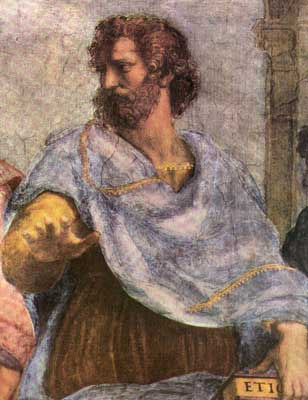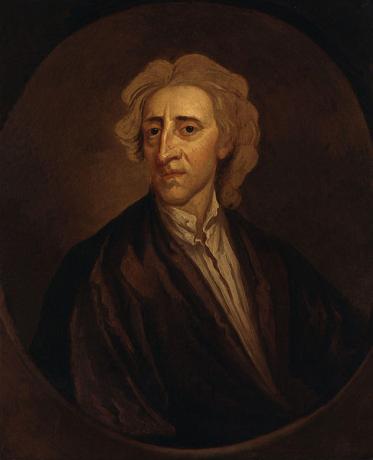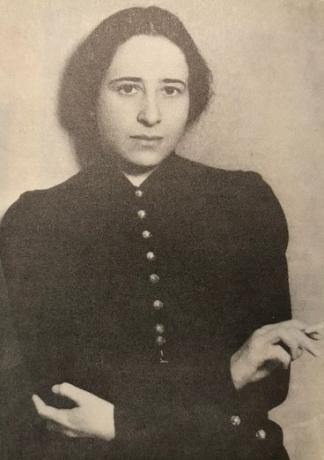THE political philosophy is the study area of philosophy concerned with the various political issues that emerge from the social interaction and the organization of this interaction in the midst of a human grouping. Unlike çscience politics, political philosophy does not use a specific method to organize their studies and assumptions, as their intention leans much more towards the problematization than for the formation of scientific knowledge, however, political philosophy is an instrument for political science.
Throughout history, various thinkers, such as Plato, Aristotle, Machiavelli, contractualists, illuminists and contemporary philosophers, developed the theories that grounded and moved political philosophy according to their times.
Read too: Marxism - sociological, philosophical and political doctrine
What is political philosophy?
THE philosophy it is a broad intellectual movement that acts on the conceptual bases of thought, always asking the so-called radical questions: “What is it?”, “What is it like?”, “Why is it?”. Thus, philosophy was described by contemporary French philosopher Gilles Deleuze as the
art of creating concepts. Philosophy seeks to understand, move and constantly create new concepts, always questioning and questioning what comes from common sense, opinion, tradition and religion.With the political philosophy it is no different, as philosophers in this field of thought have always sought to establish criticisms and foster new ideas that would give movement to the intellectual field that dares to think and question the field of political organization.

Political philosophy, by differentiating itself from political science because there is no methodical and scientific pretension, allowed the various thinkers to elaborate different theories about political organization, but always questioning and dialoguing with previous knowledge and establishing new concepts about political problems.
In this sense, philosophers (and also theorists) of politics have dedicated themselves to understand issues related to political elements, such as government, state, the notions of public and private, the different types and forms of government, in addition to ethical and economic notions strictly related to politics.
government and state
An old question for political philosophy, the notions of government and state are essential for the formation of any political and economic thought, theory, technique or doctrine. Since the studies of politics undertaken by classical philosophers such as Plato and Aristotle, there is a consensus on the most basic determination of these concepts, changing only the attributions of each within the scope political. We can conceptualize them like this:
state
The State consists of the public machine set, that is, it is the set of mechanisms that make up the public body and delimits what belongs to the community, which is different from what belongs to the private sphere. The State is delimited by what belongs to the public whole and is expressed and recognized as legitimate from of a feeling that unites people (usually compatriots who live in the same territory) around a common patriotic feeling and a culture ordinary, which nurture among themselves a feeling of solidarity and cohesion. The State, as a public machine, is fixed and, when it undergoes changes, either these must be a consensus among citizens or they must be gradual and follow the demands of society.
Government
Unlike the State, which is fixed, the government is transitory. in societies democratic, the transition must be constant. In societies governed by authoritarian governments, transience can be slow. Anyway, the government is susceptible to sudden changes, because each ruler has his way of commanding the public machine, in fact, this is the main attribute of governments – to govern the States, manage the public machine, exercise power at the state level.

Leading thinkers of political philosophy
As well as philosophy itself, which is vast of thinkers and their different theories on the most varied themes, with political philosophy it could not be different. Thus, over the more than two thousand years of philosophical tradition, we have several authors who formulated different thoughts about the way government, state, public sphere, rights, duties and freedom should be organized. We list below the main thinkers of political philosophy and their respective ideas:
Plato
Author of first work of political philosophy (and also the first political utopia) – The Republic -, the ancient Greek philosopher developed a complex political organization to what he called the perfect city. In its ideal republic, education should be totally in charge of the State from the age of 7 years of the children, who should be brought up and receive education according to their aptitudes.
Those more apt to the intelligentsia would also be more apt to the city government, becoming what Plato called "Philosopher Kings". These would receive formal education and political and philosophical instruction until they were over 40 years old, at which time they could be tested as rulers. Plato was averse to democracy as a form of government and believed that aristocracy headed by the best and fittest (the philosopher king) should be the government adopted in the perfect city. To learn more about the work and the different Platonic philosophical contributions, visit: Plato.
Aristotle
the classical greek philosopher responsible for the systematization of philosophical knowledge divided the fields of action of general and philosophical thought into three major areas: technician (responsible for the practical and technical action of arts and techniques, such as medicine); theoretical (responsible for the scientific and philosophical understanding of issues related to pure thought, such as mathematics, logic and metaphysics); practice (field that provided praxis, which, for the Greeks, was action based on reflection). Participated in this philosophical praxis the politics and the ethic, as they are philosophical areas in which human action is supported by a philosophical (theoretical) thought.
For Aristotle, the reformed democratic government (different from athenian democracy) should take space to build a fairer society. The philosopher already spoke of separation of the Legislative and Executive Powers (separation between the ruling king and legislating citizens), as proposed by the Athenian democratic model, but with the difference of electing a Constitution as the set of essential laws that could not be broken. If you want to understand more about the thought of this Greek philosopher, read: Aristotle.
Machiavelli
A Renaissance thinker, the Florentine philosopher and political theorist Nicolau Machiavelli is one of the foremost political philosophers of all times. Despite the apparent harshness of his theories, the thinker is considered a reference in political theory until today.
Machiavelli advocates a strange separation between ethics and politics. It turns out that Machiavelli is thinking of political theory as a support to the government's maintenance by the government in your book The prince. For Machiavelli, the political leader should be a kind of strategic and populist statesman, always looking for the political support from the people.
He believed that it was better for the ruler to be loved by the people than feared. However, when love did not come or when the situation did not allow the people to have positive feelings for their government, the ruler could use the fear as a way to guarantee the submission of the people and its consequent governability.
As a measure of governability, Machiavelli argued, for example, that good and positive actions of the ruler should be taken little by little and gradually, so he would always keep good memories for his people. Negative and bad actions (if necessary) should be done at once, so that the people would soon forget what happened. Learn more about the theory of this important political philosopher by reading: Machiavelli.
Contractualists
modern political philosophers, contractualists defended the existence of natural rights and a natural law that governed these rights (natural law). For these thinkers, the law of nature it defined rights that should be respected by the forms of government. They also defended that the law of nature was the only one that governed the state of nature, a hypothetical moment in which human beings did not yet live in civil society.
O pact, orsocial contract it was the landmark between the state of nature and the marital status and was established to guarantee the fulfillment of the natural rights of citizens and resolve issues not resolved by natural law. Modern contractualist philosophers are English Thomas Hobbes, the English John Locke and the franc-swiss Jean-Jacques Rousseau. If you want to delve into this form of political thinking, go to: contractualism.

Illuminists
The modern philosophers of enlightenment they formed very influential political theories in the sphere of political philosophy. They, in general, positioned themselves contrary to the absolutist monarchy like government regime and defended the guarantee of certain basic rights, that they would be inalienable, on the part of the state independently of the government.
These rights were the individual freedoms (freedom of speech, religious freedom, freedom to come and go), in addition to the right to property and free political association. They also defended the participation of non-nobles in government and the separation of State and Church. For the Enlightenment, the more there was intellectual advancement in society, the greater would be the moral advancement.
That's why they raised the flag of knowledge popularization and the provision of free and universal secular education to the population by the State. Enlightenment ideals strongly inspired the French Revolution. Theorists like Montesquieu, Voltaire, Rousseau, Diderot and D'Allambert were part of the so-called French Enlightenment. In Germany, some Enlightenment ideals gained prominence in the philosophy of the Prussian thinker Immanuel Kant.
Frankfurt School
Already established in the 20th century, the thinkers of the Frankfurt School (also known as Frankfurtians) were primarily concerned with adopt the political and economic theories of Karl Marx as an ideal model for application in society. They also criticized specific points of the Enlightenment, such as the idea that the intellectual advancement of society would promote its advancement. moral.
The Frankfurtians used the phenomenon of totalitarianism of the 20th century to support your anti-enlightenment theory: the advancement of scientific knowledge did not promote moral advancement, as the capitalism it allowed the technique and science, advanced in the 20th century, to be used to promote the mass death of people in concentration camps.
The policy undertaken by capitalism, in the authors' view, was responsible for the same type of thinking that unleashed totalitarianism. Learn more about this philosophical and sociological movement by visiting: Frankfurt School.
Hannah Arendt

Jewish and German, the philosopher and political theorist Hannah Arendt is one of the main voices of contemporary political philosophical thought. Arendt undertook one of the greatest philosophical studies on totalitarianism, the book The Origins of Totalitarianism. She also drew up specific studies on totalitarianism and contemporary politics.
One of his most widespread works, the book Eichman in Jerusalem, traces an analysis of the profile, defense and judgment of the Nazi criminal Adolf Eichman, escaped and captured by the Israeli secret service in 1962 and tried and convicted in a court of exception. Learn more about this political philosopher and her important theory by reading: Hannah Arendt.
by Francisco Porfirio
Philosophy teacher
Source: Brazil School - https://brasilescola.uol.com.br/filosofia/filosofia-politica.htm
